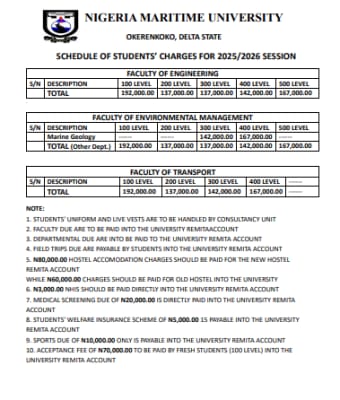The Nigerian Maritime University (NMU), located in Okerenkoko, Delta State, has officially released its approved fee schedule for the 2025/2026 academic session. This update affects students across all three main faculties: Engineering, Environmental Management, and Transport. The new fee structure reflects not only the tuition costs per level but also several mandatory and ancillary charges that students must budget for.
Detailed Fee Schedule
Here is a breakdown of the approved fee structure for different faculties and levels within NMU for the 2025/2026 academic year, based on the latest published schedule.
1. Faculty-by-Faculty Breakdown (Tuition)
Faculty of Engineering
- 100 Level: ₦192,000
- 200 Level: ₦137,000
- 300 Level: ₦137,000
- 400 Level: ₦142,000
- 500 Level: ₦167,000
Faculty of Environmental Management (including Marine Geology and related departments)
- 100 Level: ₦192,000
- 200 Level: ₦137,000
- 300 Level: ₦137,000
- 400 Level: ₦142,000
- 500 Level: ₦167,000
Faculty of Transport (Logistics, Nautical Science, etc.)
- 100 Level: ₦192,000
- 200 Level: ₦137,000
- 300 Level: ₦142,000
- 400 Level: ₦142,000
- 500 Level: ₦167,000
These numbers show that NMU has retained a relatively consistent tuition structure across its faculties, with the most significant jump occurring between 400 Level and 500 Level in Engineering and Environmental Management.
Additional Mandatory Charges
Beyond tuition, students are responsible for several compulsory fees. These must be factored into financial planning, as they significantly impact the total cost of attendance.
- Acceptance Fee (Fresh Students): ₦70,000
- Medical Service / Insurance: ₦5,000 — this covers NMU’s student health-insurance scheme
- Hostel Accommodation:
- New (on-campus) Hostel: ₦80,000
- Old (on-campus) Hostel: ₦60,000
- SMS / Bulletin Fee: ₦3,000
- Welfare Insurance: ₦5,000 — part of a student welfare insurance scheme
- Sports Levy / Dues: ₦10,000
In addition:
- Faculty dues and departmental dues are required; payments are made via the university’s designated Remita account.
- Uniforms and life vests (for certain students) are handled through the university’s Consultancy Unit, meaning these costs are separate from the tuition structure.
Financial Implications & Student Considerations
A. Budgeting Complexity
For many students, the disclosed fee schedule underscores a complex financial commitment. It’s not just tuition — students need to budget for housing, insurance, departmental dues, and more. Fresh students, particularly, will need to prepare for a sizable up-front payment just to secure their place and accommodation.
B. Housing Pressure
The wide gap between hostel fees for new and “old” students indicates that accommodation cost will be a considerable burden, especially for first-year undergraduates who may not yet have alternative housing options.
C. Health and Safety Costs
The medical service fee is modest when compared to many private universities, but it’s important: it ensures that every student is covered under a health-insurance scheme. However, this does not necessarily cover all medical costs, so students should still plan for emergencies.
D. Administrative Transparency
By requiring students to pay faculty dues and departmental dues via Remita, NMU ensures there is a formal, bank-mediated payment trail. This could foster transparency and accountability. Nonetheless, students must be careful to use the correct payment channels to avoid rejected payments or financial losses.
E. Gear Requirements
The involvement of a Consultancy Unit for life vest and uniform provision suggests an institutional recognition that maritime students need safety gear as part of their training. However, because these items are not bundled in tuition, students must set aside extra funds to cover them.
Strategic Advice for Students
Given this fee schedule, prospective and returning NMU students should consider the following strategies:
- Early Payment
- Try to pay as much as possible early, especially acceptance fees and hostel fees, to avoid first-term financial crunch.
- Use the Remita account carefully and double-check the correct account details to avoid mispayment.
- Explore Funding Options
- Scholarships, government grants, or student loans (where available) should be explored to manage the high fixed costs.
- Also consider part-time or campus-based work to offset recurring expenses like departmental dues or welfare insurance.
- Housing Decisions
- New students should weigh the cost and benefits of staying in new hostel vs. old hostel.
- If off-campus living is an option, compare total cost (rent + transport + utilities) against the official hostel fees.
- Gear & Safety Equipment
- Since safety gear like life vests and uniforms are not included in the tuition, ensure you budget for them early.
- Ask the Consultancy Unit for estimates or previous-year cost benchmarks.
- Maintain Payment Records
- Always keep receipts or confirmation of payment (especially for Remita transactions).
- Confirm payments with bursary / finance office immediately after payment to avoid last-minute exam or registration issues.
Conclusion
The 2025/2026 fee schedule released by Nigerian Maritime University is comprehensive, clearly outlining not just tuition but additional essential charges. While the financial burden for students is significant, especially for first-year undergraduates, the university provides a relatively transparent structure for payments.
Students who carefully plan, budget, and use available payment systems responsibly should be able to navigate this financial landscape. However, the cost of maritime education remains high — and for many, the success of their university experience will hinge on effective financial planning and support.



